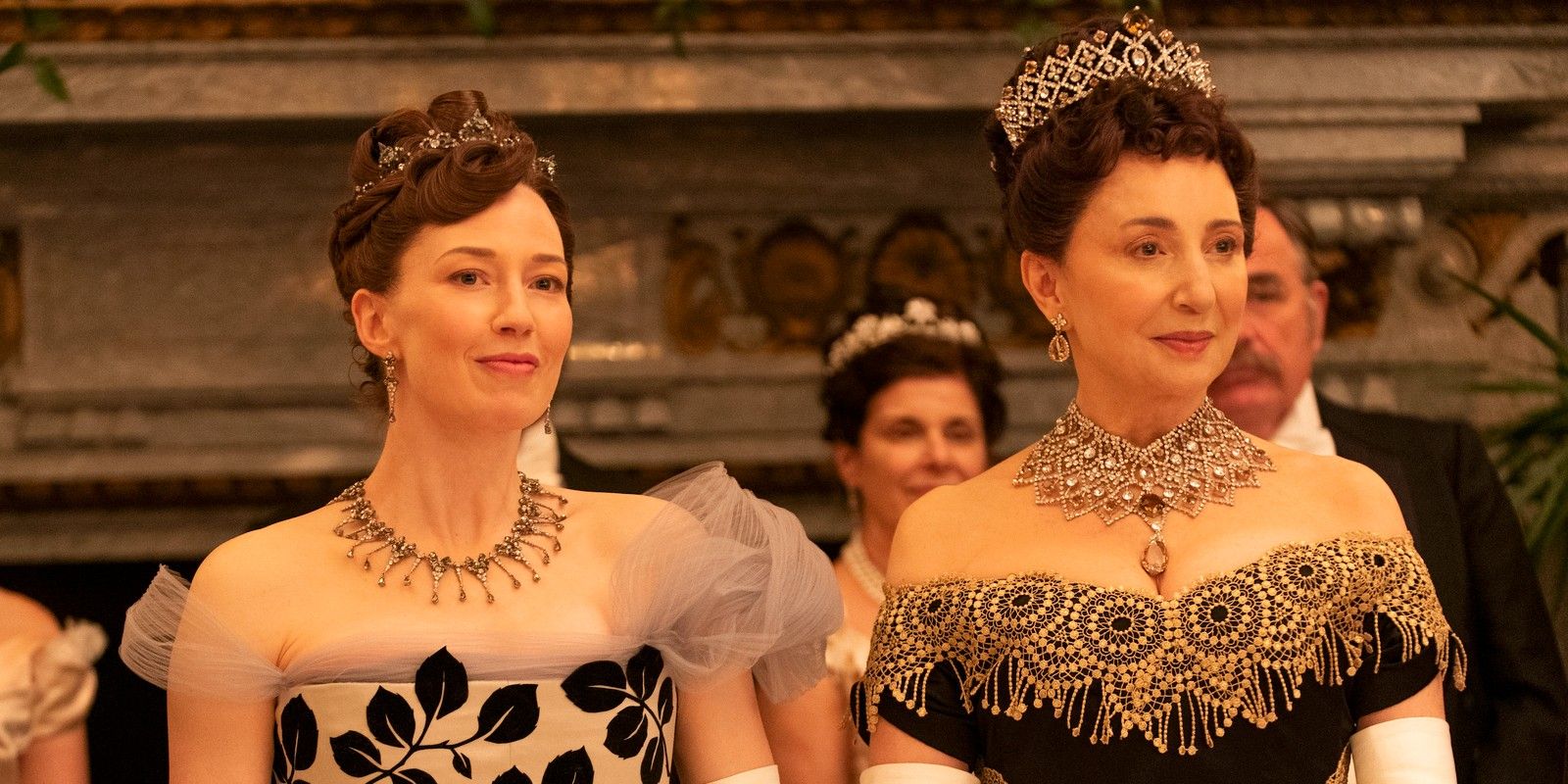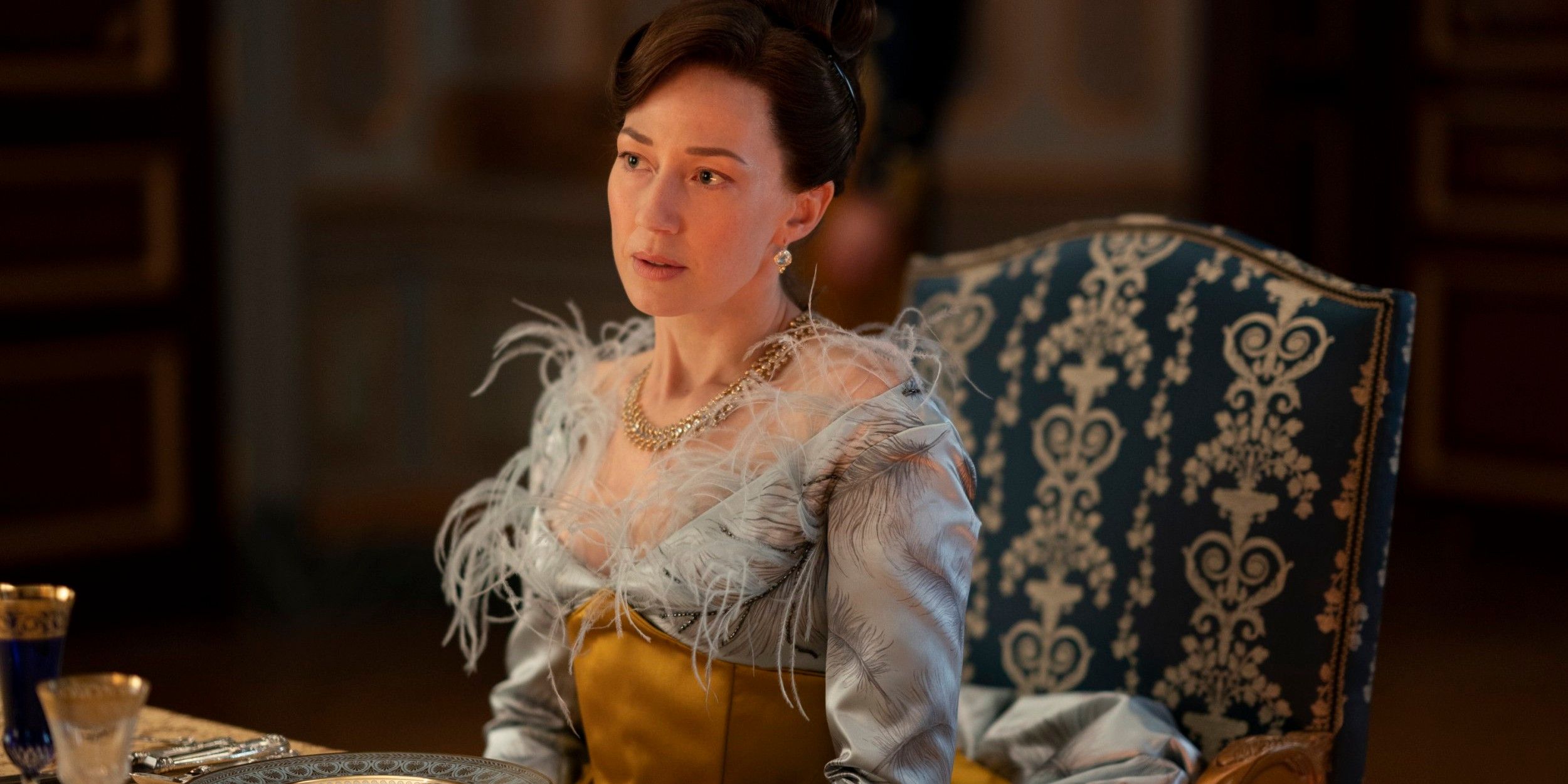Gilded Age Creator Reveals Real Inspiration For Bertha/Astor Conflict

Warning: This post contains spoilers for The Gilded Age's season 1 finale.
The Gilded Age creator Julian Fellowes shares the real life inspiration for the finale's conflict between Bertha Russell and Mrs. Astor. The HBO series premiered in January and secured a second season for itself after garnering positive reviews from audiences and solid ratings for the network. Much like Fellowes' international hit Downton Abbey, The Gilded Age focuses on the lives of wealthy elites and their downstairs staff. This time, however, the action takes place in New York City rather than England, and it is set in 1882, at a time when new money was colliding with the values of old money.
The Gilded Age's finale aired Monday night and seemingly brought about a new status quo for the upper class of New York. All throughout the season, robber baron wife Bertha Russell (Carrie Coon) plotted ways to be accepted by the city's old money crowd, which is largely led by real life figure Lina Astor (Donna Murphy). Bertha's efforts were constantly thwarted by those like Mrs. Astor, who sought to keep her out of their world. However, Bertha scores a major win in The Gilded Age season 1 finale by essentially blackmailing Mrs. Astor into attending her lavish ball; if Mrs. Astor wouldn't agree to come, her daughter Carrie (Amy Forsyth) wouldn't be allowed to perform the dance she had learned with Mrs. Russell's daughter Gladys (Taissa Farmiga).
In the end, Mrs. Astor bows to the pressure, and she brings a large swath of the old money crowd with her. Speaking to THR following the Gilded Age finale, Fellowes revealed that this storyline was actually born from a real incident that happened with Mrs. Astor. However, rather than Bertha Russell, it was actually Alva Vanderbilt. Fellowes explained:
In real life, Alva [Vanderbilt] was determined that her ball was going to be a success and she hadn’t managed to persuade Mrs. Astor to take her seriously. And she deliberately encouraged the friendship between her own daughter and Mrs. Astor’s daughter, Carrie, and they worked up this little dance they were all going to do with costumes and music and so on and so forth. And then at the last minute [Alva] said, “Well, if your mother isn’t coming, I’m afraid we have to cancel this.” And it had the desired effect. I love the almost cynicism of that, that she was prepared to use this young woman, who is completely innocent, as her tool to get her mother into the house and it just made me laugh when I read it. So I thought I would use it in this show.

The Gilded Age interacts with American history more often than one might expect from the outset. While those like the Russells and Agnes van Rhijn (Christine Baranski) are fictional characters, their world is filled out by figures who lived and breathed in 1800s New York. Outside of the Astors, The Gilded Age episode 6 featured Thomas Edison (Mat Hostetler), and Clara Barton (Linda Emond) has been a prominent recurring figure. Fellowes' decision to outright take a real life moment between the Vanderbilts and the Astors for The Gilded Age is a new way of integrating history, but it certainly made for great drama nonetheless.
As both Mrs. Astor and Agnes hinted at in the finale, their battle with Bertha isn't quite over. Bertha's blackmailing of Mrs. Astor is a shrewd example of the lengths she will go to win, but it also might not have won her many supporters. With The Gilded Age set to return for season 2, audiences can expect this conflict to only grow deeper as the series progresses. Only time will tell if Bertha manages to go the way of Alva Vanderbilt, or if she will fall short in her lofty ambitions.
Source: THR
Source: Screenrant
Post a Comment